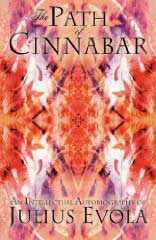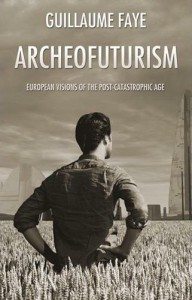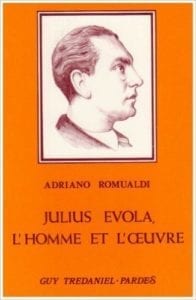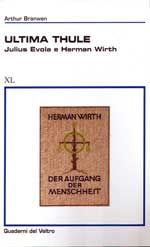 Not previously available in the English language, this is the first translation of Julius Evola’s autobiography, Il Cammino del Cinabro. The book provides a guide to Evola’s corpus as he explains the purpose of each of his books. This book is the key which unlocks the unity behind Evola’s diverse interests. It is a perfect place to start for those new to Evola’s thought, and a must read for all seasoned Evolians. The book includes hundreds of well-researched footnotes and a complete index. The book is avalaible here.
Not previously available in the English language, this is the first translation of Julius Evola’s autobiography, Il Cammino del Cinabro. The book provides a guide to Evola’s corpus as he explains the purpose of each of his books. This book is the key which unlocks the unity behind Evola’s diverse interests. It is a perfect place to start for those new to Evola’s thought, and a must read for all seasoned Evolians. The book includes hundreds of well-researched footnotes and a complete index. The book is avalaible here.
Book Description
Julius Evola was a renowned Dadaist artist, Idealist philosopher, critic of politics and Fascism, ‘mystic’, anti-modernist, and scholar of world religions. Evola was all of these things, but he saw each of them as no more than stops along the path to life’s true goal: the realisation of oneself as a truly absolute and free individual living one’s life in accordance with the eternal doctrines of the Primordial Tradition. Much more than an autobiography, The Cinnabar Path in describing the course of Evola’s life illuminates how the traditionally-oriented individual might avoid the many pitfalls awaiting him in the modern world. More a record of Evola’s thought process than a recitation of biographical facts, one will here find the distilled essence of a lifetime spent in pursuit of wisdom, in what is surely one of his most important works.
Table of Contents
Foreword
A Note from the Editor
A Note from the Publisher
1. The Path of Cinnabar
2. Personal Background and Early Experiences
3. Abstract Art and Dadaism
4. The Speculative Period of Magical Idealism and the Theory of the Absolute Individual
5. My Encounters with the East and ‘Pagan’ Myth
6. The ‘Ur Group’
7. My Exploration of Origins and Tradition
8. My Experience with ‘La Torre’ and Its Implications
9. Hermeticism and My Critique of Contemporary Spiritualism – The Catholic Problem
10. ‘Revolt Against the Modern World’ and the Mystery of the Grail
11. My Work in Germany and the ‘Doctrine of Awakening’
12. The Issue of Race
13. In Search of Men Among the Ruins
14. Bachofen, Spengler, the ‘Metaphysics of Sex’ and the ‘Left-Hand Path’
15. From the ‘Worker’ to ‘Ride the Tiger’
Appendix: Interviews with Julius Evola (1964-1972)
Additional Information
Title: Julius Evola: The Path of Cinnabar
Author: Evola, Julius
Full Title: The Path of Cinnabar: An Intellectual Autobiography
Binding: Softcover (also avalaible in a hardback edition)
Publisher: Integral Tradition (2009) – Arktos
Pages: 302
ISBN: 9781907166020
Language: English
Customer review (Source: Amazon.com)
James J. Omeara: Tradition and “The Personal Equation”
The author and translator are both quick to point out that this may be the strangest autobiography ever. Almost completely lacking in clichéd “personal details,” they also both suggest that the book is best regarded as a “guide to [Evola].” As such, this book, long out of print even in Italy, will be self-recommending to the vast and ever-growing crowd of what author and translator jokingly call “evolomaniacs.”
As already noted, Evola provides few if any details of childhood rebellion, love affairs, etc., although there is this cryptic remark: “A spontaneous detachment from … what is generally regarded as normal, particularly in the sphere of affection, emerged as one of my distinctive traits when I was still in my early youth; or rather, it emerged ESPECIALLY in my early youth.” [page 6, emphasis Evola]. In fact, Evola denies any relevance to his environment or heredity, at least in biological terms.
Instead, Evola provides us with his `personal equation,’ a predisposition that he is, indeed, predisposed to attribute to a pre-natal, pre-human existence, taking the form of an thirst for transcendence, what he elsewhere calls “the life which is more than life,” combined with, in Hindu terms, “a kshatriya bent,” manifesting as an hierarchical, aristocratic, and feudal taste.
These two somewhat contradictory features, a “longing for liberation” and an urge for action resulting in self-affirmation, would form his “existential task” and only be reconciled in “my definition of ‘traditionalism’ in my later works.”
Each chapter, then, details the various intellectual and political milieus that Evola found available in the first half of the XXth century, and how he approached, assimilated, and in some cases, most notably the Traditionalist current promoted by Rene Guenon, re-designed each for his own purposes, in accordance with the aforementioned `personal equation.’
Speaking of `tradition:’ Since the ‘evolomaniacs’ will want this book for the content anyway, the only question relevant here is: how well have the publishers `handed on’ [traditio] Evola’s guide to himself? How well have the translator and editors done their job?
Lacking not only a knowledge of Italian but even the Italian text, I am not of course in a position to offer an authoritative critique of Segio Knipe’s work. However, I can convey my impressions of the result, both as a native speaker of English, as well as a reader with some background in a least one of the many areas of “the Baron’s” expertise.
[Speaking of “The Baron,” although the translator, like many others, refers to him as such, there is no evidence in this book, or anywhere else that I have looked, such as the Almanach de Gotha, to show that he was, in fact, an aristocrat — other than one of the Spirit. Indeed, Evola himself not only never calls himself `Baron,` and slyly says on page 10 that while he never took a university degree because he didn’t want to be addressed by some bourgeois title, “I was later to be addressed with all sorts of titles which I do not, in fact, possess.” Until proven otherwise, I will insist that his title has the same authenticity as “Baron” Corvo’s].
To start with the area of expertise: having been a student of German Idealism in my university days, the chapter I most looked forward to was the one dealing with Evola’s attempt to master, and then dominate, the [according to him] sorry state of Italian Idealism [Croce, Gentile, etc.] with his own doctrine of Magical Idealism, especially since not even the texts themselves have been translated [other than some lectures available at the Gornahoor site].
Unfortunately, this chapter, the longest in the book, seems to have taken Fichte rather than Schopenhauer as its model, and even someone with the aforementioned scholastic background would find it tough going. Of course, this is Evola’s fault, not the translator’s; however, the translator has not made things any easier by some idiosyncratic renderings of frequent, and important, terms: most particularly, `placing’ for what is usually translated from German as `positing,’ and `conscience’ in some places for what must be the Italian for `consciousness.’ Although this may reflect some nuance in Italian discussions of Idealism, I think it will needlessly confuse the neophyte, who will have enough problems with Evola’s Magical Idealism itself.
A few other infelicities: the Fascist publisher Bottai presumably “turned on” Evola, rather than “turned down,” since the articles did appear, but generated a firestorm of protest; and while a `disproval’ is indeed English, it’s an awkward way to `disprove’ something. Otherwise, the translation is quite flowing and idiomatic, even a pleasure to read.
As for the editor’s contributions, these include nearly all of the many footnotes, which provide annotations that go beyond merely filling in names and dates [for which Evola seems to have had an aristocratic disdain, especially English names — “Mutton’ for “Musson,’ etc.] to include extensive cross references to books and online resources for further research. I can find no controversial area of Evola studies, from anti-Semitism to National Socialism to sex magic, that the editors have failed to anticipate and provide appropriate guidance.
Of course, one can always find areas of disagreement. The note on page 76 implies that Nietzsche simply “rejected” the antithesis between Apollonian and Dionysian as propounded in his first book, The Birth of Tragedy. This is far too blunt; at best, Nietzsche continued to refine the contrast, and Julian Young has argued convincingly that it continued to ground his thought right to the end.
Also, the note on page 17, while containing valuable references to Wasson and Furst, fails to take into account more recent research, by Michael Hoffman for example, which would correct Evola and the editors’ claim that the Greek mystery religions used “wine or other drugs;” Greek wine was no more hallucinogenic than our own, and rather than assuming, as some scholars have, that the Greeks had a different metabolism than our own, we can infer that additional drugs were added to the wine when “mixed” for serving.
Finally, the note on page 151 misleadingly cites a French translation of Hans Bluher as if it were in English; given the almost total lack of English versions of Bluher’s work, despite his influence from the Wandervogel to Francis Parker Yockey, it might have been good to refer the reader to such related works as Hubert Kennedy’s collection, Homosexuality and Male Bonding in Pre-Nazi Germany.
The editors have also included translations of six interviews of various lengths, one new, the rest having appeared in the appendix to the Italian edition of Ride the Tiger, totaling 20pp of additional material. Providing clarification on some points, and bringing in Evola’s views on the contemporary scene, they also provide some charmingly dated slang: “beat girls”? And what on Earth was “the nude look”? Yowsa!
As for the book’s production, the only outright error I can find in the text is `bow’ on page 236, where Evola has already explained that word, appearing in his title, The Bow and the Club, and must now be explaining the `club.’ Also, while there is a beautiful and appropriate cover by Michael Lujan, one wonders whether some of Evola’s own Dadaist paintings could not have been included as well.
All in all, this is a exceptionally fine edition of an essential book by one of the XXth century’s most essential thinkers. Since the Italian edition is out of print, and given the valuable editorial additions and appendices, this English language version will be the one everyone should get from now on. The publishers are to be congratulated, and above all rewarded with massive sales!
Comment







 ***
***
Nejnovější komentáře